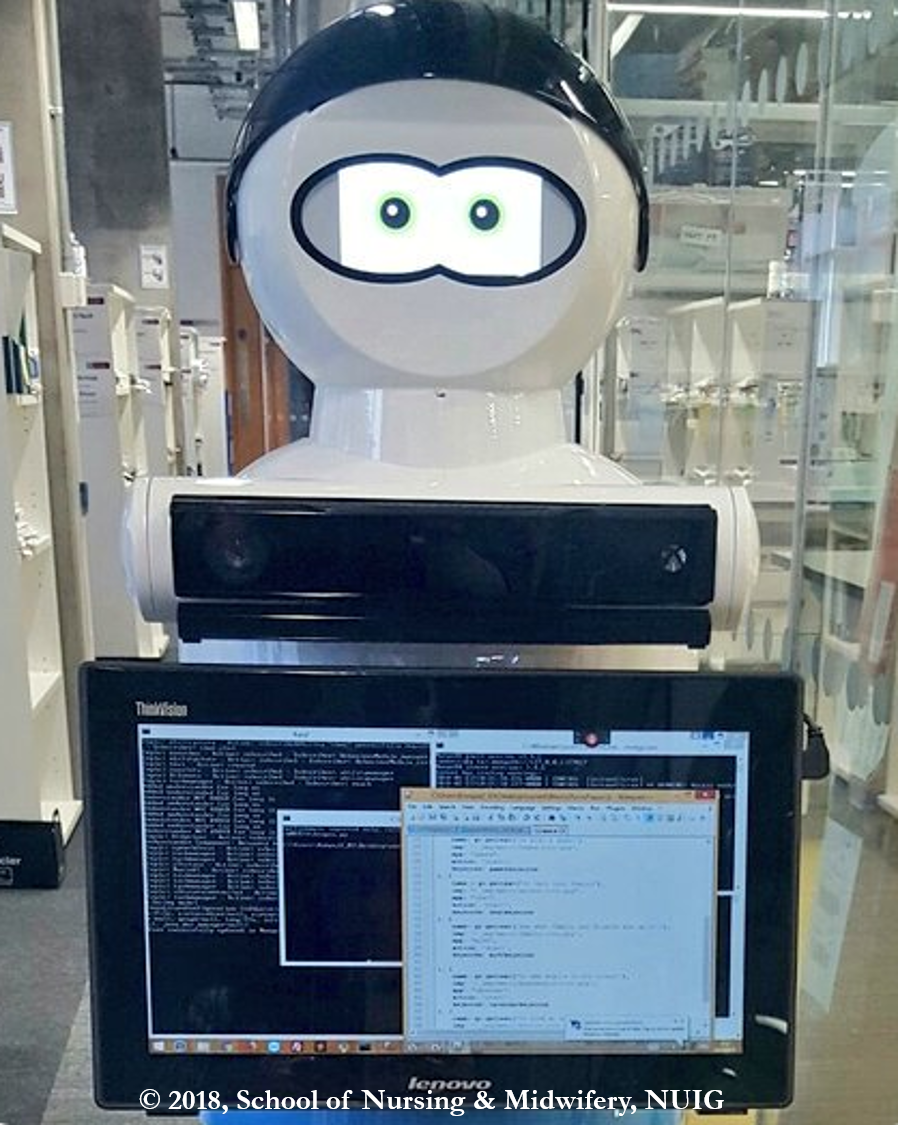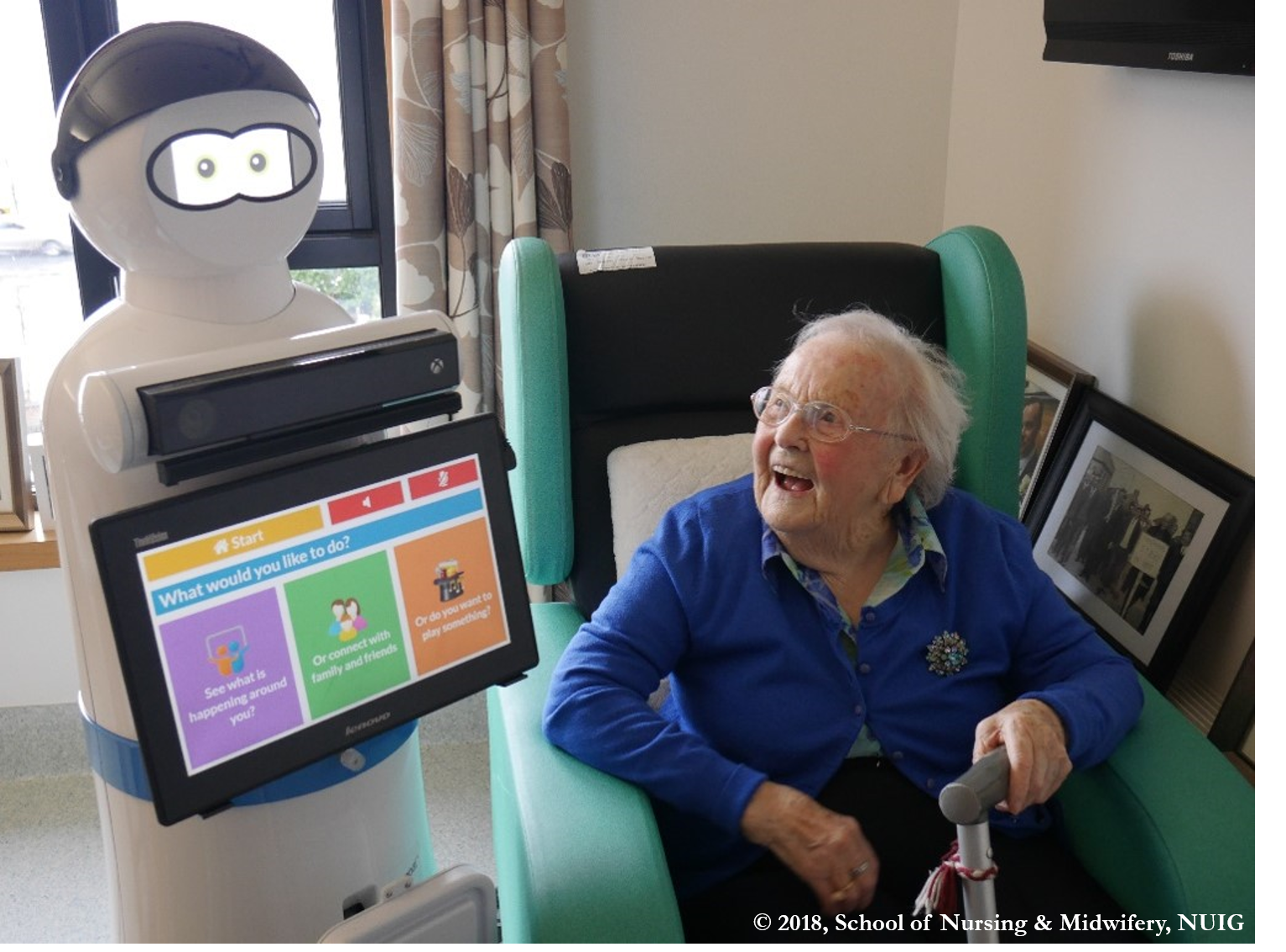Mario - Managing active and healthy ageing using caring service robots
Introduction
Globally, around 50 million people are living with dementia, with this number set to increase as the number of people living into old age rises (WHO, 2017). Loneliness and social isolation are major issues facing older people with dementia. Although human companionship is the best way of reducing social isolation, the resources to provide this service is often not available. MARIO addresses the difficult challenges of loneliness, isolation and dementia in older persons through innovative and multi-faceted interventions delivered by companion robots.
The MARIO project was coordinated by the School of Nursing and Midwifery in the National University of Ireland, Galway, led by Professor Dympna Casey. A consortium of experts from the health care sector, robotics industry and dementia groups was created. This led to the three year MARIO project, which received €4 million in funding from the European Union’s Horizon 2020 - the Framework Programme for Research and Innovation (2014–2020). The project involved five EU countries and a team of up to 40 people, and was completed in January 2018.

Objectives/Purpose
The aim of the project was to address the challenging problems of loneliness and isolation experienced by older people with dementia.
The Journey
A user-led design process was used and the MARIO robot was tested in three pilot sites; a hospital in Italy, a residential care home in Ireland, and a community setting in the UK. Three phases of testing were undertaken where MARIO engaged with people with dementia in each pilot site. This resulted in the development of a number of personalised robot applications including: My Chat, My Memories, My Music, My Games, My News, My Calendar, and My Family & Friends. In the final phase, the impact of the MARIO robot was evaluated using questionnaires, observations and interviews. People with dementia, their family members, formal carers, and managers across all three pilot sites were involved in the final evaluation.
Benefits and key facts
This user-led design led to the development of applications that were tailored to the needs of people living with dementia. These applications allowed people with dementia to access the newspapers, listen to their favourite songs, provide reminders of upcoming events, store family photos and connect with their friends and families. Overall, attitudes towards the MARIO robot were positive. People enjoyed spending time with MARIO, saw him as a companion, a source of entertainment and a source of interaction.
The findings from this study provide evidence related to the potential for the use of companion robots. The MARIO project established that companion robots are an acceptable part of social care for people with dementia. They have an important role to play in combatting the perceptions of loneliness, can decrease the amount of time people with dementia spend alone, and increase levels of engagement. The positive impact of MARIO on the quality of life, social and cognitive health, and loneliness in people with dementia is evident.
These results demonstrate that companion robots have potential use in dementia care. The outputs from the project will help to shape the development and design of future companion robots for use with older people with dementia. The contribution and impact of the MARIO project is such that it has featured in an EU study analysing the impact on society of EU-funded research and innovation in technology for active and healthy ageing. The MARIO project is listed among 25 projects credited, and the only one in Ireland, with having had the most influence in Europe over the last 11 years. The MARIO project also received a commendation for ‘Best use of Information Technology’ at the 2018 Irish Healthcare Awards, which recognises innovation, excellence and achievement in the Irish healthcare sector.
The learning
A key feature of the project was the user-led design in that the robot was developed with and for people with dementia, which resulted in apps customised for people living with dementia. This work is to our knowledge the only study to date which has tested and evaluated a companion robot developed with and for people with dementia, at different stages of dementia, over such an extended time period, in the real world of dementia care across three different care contexts and three different countries.

Resident, Mary Gannon enjoying time with MARIO at St. Brendan's Care Home, Loughrea, Co. Galway. Photo: NUI Galway
Quotes:
Patients -
“It (MARIO) helps me to pass the time with the games and the music and it (MARIO) allows me also to see my children when they cannot come to see me” (Italy)
“…It (MARIO) is good if you are on your own as it is something to interact with. I just wish there was someone there all the time to interact with. Without having to leave the house” (UK)
“Oh, I’d love one of these (MARIO) – so if you buy me one I’ll give you the money” (Ireland)
Project Coordinator -
Professor Dympna Casey from the School of Nursing and Midwifery at NUI Galway, and MARIO project coordinator explained: “MARIO was an ambitious project from the beginning. We managed to combine an array of expertise through pan-European partnerships. We brought together expertise in robotics, semantic data analytics, artificial intelligence and interactive touchscreen technology, as well as healthcare and nursing knowledge. However, the most critical element were the older people with dementia and their caregivers, who welcomed MARIO into their lives and allowed us, through their insights and knowledge, to make MARIO into the success it has become.”
Supporting materials
To watch MARIO on EuroNews’ Futuris programme, visit: http://www.euronews.com/2018/04/06/me-and-mario-robots-that-care
For further information please visit: http://www.mario-project.eu or follow on Twitter @mario_project
- Ambulance Arrivals Project A Case Study
- SNOMED National Release Centre (NRC)
- SVUH Award winning Patient Flow Whiteboard
- Scan for Surgery
- Hospital-based care
- Digital Natives Sign App
- Digitisation of risk assesment tools for Adult mental health services in north Dublin
- Patient Engagement Operating Systems - Hep C
- Digital Transition for HSCPs at St. James's Hospital
- Primary Care Centre Castlebar Case Study
- Mario - Managing active and healthy ageing using caring service robots
- Claimsure - Health Insurance Claims Management System
- Cyber Attack Response
- Data systems in SVUH Emergency Department
- Electronic Discharge Prescription Pilot
- Epilepsy EPR
- eReferral
- eReferral Radiology Pilot
- eRostering
- Electronic Blood Tracking
- GP Practice Management Systems
- Healthmail
- Heart Failure Virtual Clinic
- Infrastructure - MPUP to ECAM
- IT Security - Small changes, big difference
- Kidney Disease Clinical Patient Management System
- Local Asset Mapping Project at St James' Hospital
- LUCY
- Mi Kidney App
- Model Community
- NCHD - Employment Record Portal
- Nursing & Midwifery Quality Care Metrics
- Ophthalmology Electronic Patient Record
- PharmaBuddy
- Radiology & Electronic Patient Record
- National Smart-Pump Drug Library of Paediatric and Neonatal Standardised Concentration Infusions
- Quality & Patient Safety
- Robotic Assisted Surgery Programme
- Shared Learning on EHR
- St. James' Hospital - National Haemophilia System
- Tallaght Hospital Pharmacy
- Tallaght Hospital Patient Engagement App
- Track & Trace
- Using IT to Improve Ireland's Public Sector Healthcare
- National Audiology Clinical Management System (NA-CMS)
- St Vincent's University Hospital Award Winning Whiteboard Patient Flow System
- Snomed Case Study
- Telehealth Project Donegal
- St Vincent's Whiteboard Patient Journey System a Case Study
- Ambulance Arrivals Project

